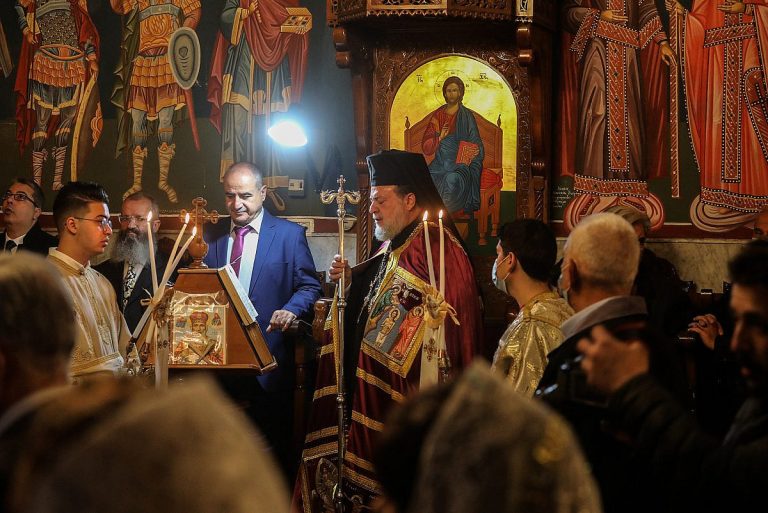This holiday season, few things reminded Palestinian residents of Bethlehem, the birthplace of Jesus Christ, that it was Christmas time. Indeed, the city marked December 25 not as Christmas, but as day 80 of a brutal war that has engulfed all of historic Palestine since October 7.
Bethlehem’s typical events at this time of year – the tree lighting ceremony, bustling market, Boy Scout parades and other celebrations – had all been canceled. Grief and fear prevailed as two million Palestinians in the Gaza Strip continued to endure Israel’s brutal military offensive and punitive siege, which left more than 20,000 Palestinians dead. The usual joy that lights up the city was impossible to find, making it an unrecognizable Christmas time.
The decision to let the month proceed without its typical festivities was proposed by various churches and priests and approved by the Bethlehem municipality, which oversees the annual celebrations. Souvenir shops and restaurants, usually filled with tourists and visitors from across Palestine, were largely empty. The Church of the Nativity, the oldest Christian holy site in the world, would normally be packed; Today, no one lines up to see the place where Jesus is said to have been born.
Traditionally, outside the church there was also an imposing Christmas tree. This year, in its place, Bethlehem artists erected a monumental exhibition of the Flight of Jesus and the Virgin Mary into Egypt. This story has painful resonances with the violence in Gaza, where 80 percent of the strip’s residents have been displaced and even face the imminent threat of total expulsion.
The Lutheran church, a 19th-century building built by German pilgrims, has literally placed the ongoing war against Gaza center stage: on the church altar there is a pile of bricks and stones looking like rubble, with a baby Jesus doll wrapped in it. in a Palestinian flag.
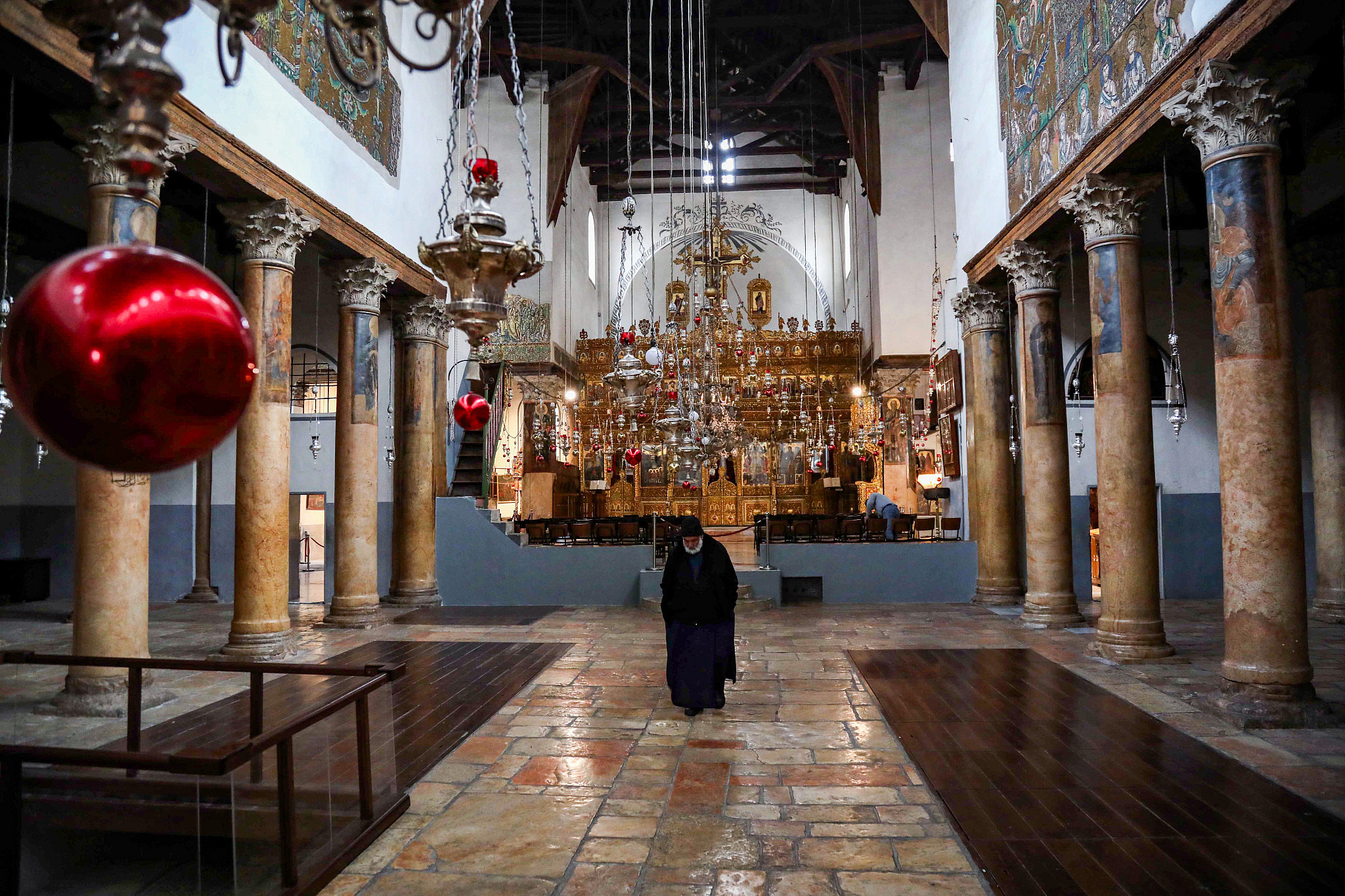
A priest walks through the empty Church of the Nativity in the West Bank city of Bethlehem on the eve of Christmas Eve, December 23, 2023. (Wisam Hashlamoun/Flash90)
The church’s pastor, Mitri Raheb, told +972 that the exhibition was the only way to make Christmas relevant this year, hoping it would inspire thoughts and prayers for those lying under the rubble in Gaza . “Elements of the Christmas story resonate in our (Palestinian) history,” he said. “Christmas can speak to us in a very profound way. It is about God’s solidarity with us. We hope that Jesus is watching (Gaza) and is with them.
The Rev. Fadi Diab of the Episcopal Church in Ramallah warned that the current war could mark a dark historical moment for Christians in the Middle East, and in Palestine in particular, where Christian life is particularly precarious under the weight of occupation. At the start of the 20th century, he says, about 17 percent of the Palestinian population was Christian; today that figure is only 1 to 2 percent, with most Palestinian Christians now living in the diaspora.
Pastor Raheb, who is also a theologian and founder and president of Dar Al-Kalima College in Bethlehem, spoke about the gravity of this year’s loss. “One of the many tragedies of the war is that it will end the existence of Palestinian Christians in Gaza. We can’t go on with our lives and pretend that nothing is happening here. We’re not in the mood to party. While the world watches Bethlehem, we want them to see what is happening there, in Gaza.”
No security in churches
Reverend Diab told +972 that Christians have lived in the Gaza region since around the third century. Markers of its rich Christian history have continued to arise over the years: in September 2022, for example, an accidental historical event Discovery gave a sense of pride to the few remaining Christian families in the Gaza Strip – a 1,500-year-old Byzantine mosaic attesting to the richness of Christian life in Gaza.
However, over the past 16 years – since Israel imposed its blockade on the Gaza Strip following Hamas’s takeover – Gaza’s already reduced size Palestinian Christian population fell by two thirds, from almost 3,000 to just 1,000. The main reasons for this emigration, according to for many members of the community itself, were linked to the Israeli occupation and blockade, and not to a sense of religious persecution within Palestinian society.
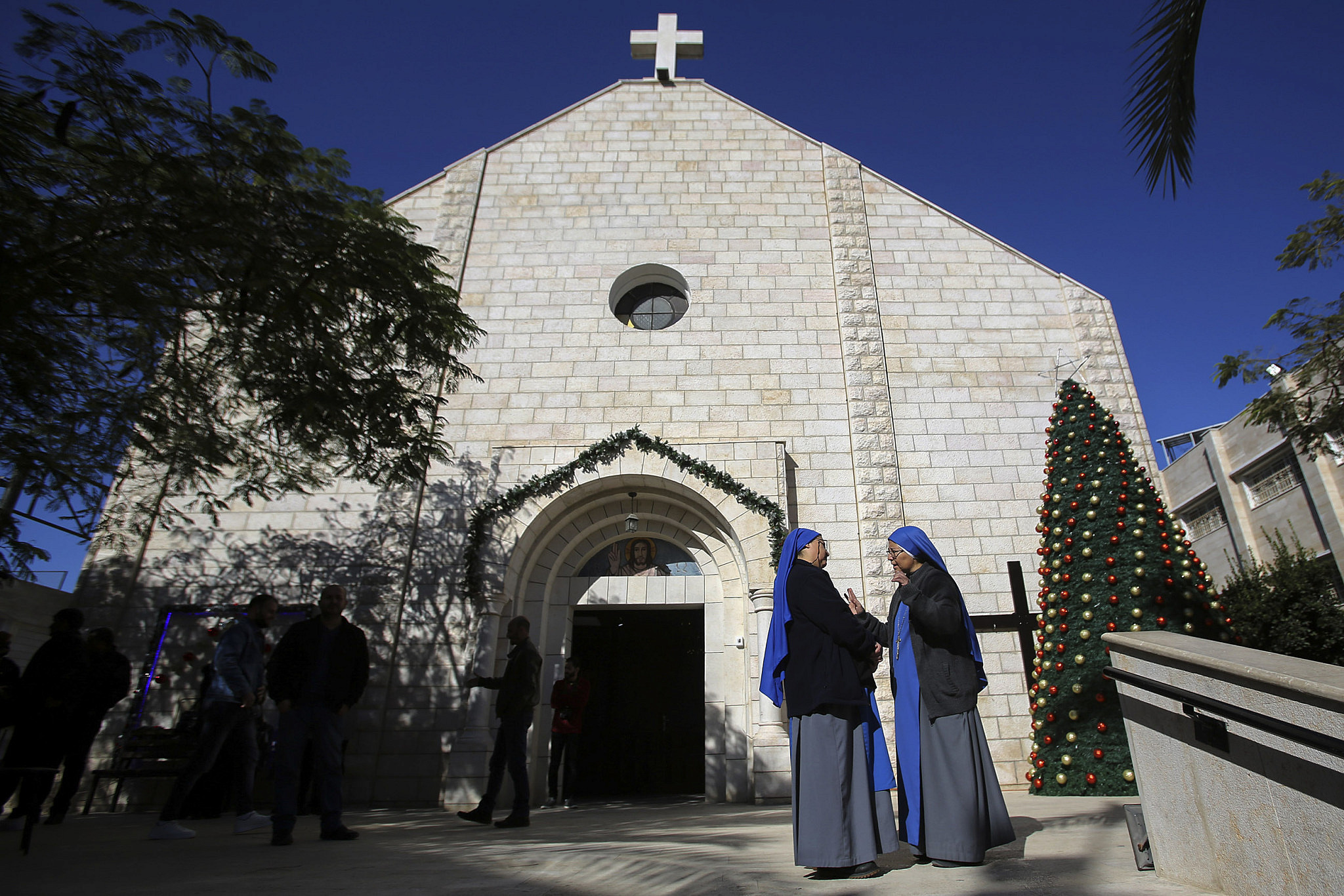
The Apostolic Administrator of the Latin Church in the Holy Land, Pierbattista Pizzaballa, leads a mass for Palestinian Christian faithful from the Gaza Strip in the Roman Catholic Church of the Holy Family at the start of the Christmas holidays, in the city of Gaza, December 19, 2021. (Atia Mohammed/ Flash90)
Since the outbreak of the current war, Christian life, like the rest of Palestinian life in the Gaza Strip, has been under serious threat. Christian sites and places of worship in Gaza have been repeatedly targeted by Israeli forces. Earlier this month, two Palestinian Christian women, Nahida Khalil Anton and her daughter Samar, were shot and killed by an Israeli sniper at Holy Family Parish, the only Catholic church in Gaza.
Catholic and Greek Orthodox churches have been the target of Israeli airstrikes on several occasions, according to the Patriarchate of Jerusalem. One such strike occurred a day before the killing of the elderly mother and her daughter, damaging the only generator and water tanks owned by the Latin Church, according to witnesses.
The vast majority of the region’s Christian community is now believed to have taken refuge in the Latin church in Gaza City, in the north of the Strip, where Israeli troops have been carrying out a ground offensive for weeks. Several hundred of them were initially sheltering in the Greek Orthodox church elsewhere in the city, but an Israeli airstrike forced them to flee to the other place of worship.
Ramzi Andrea, 458, is a Greek Orthodox Christian from the Al-Zaytoun neighborhood in Gaza City, who has been displaced with his entire family three times since the start of the war. He is now one of a handful of Palestinian Christians who have fled to the southern city of Rafah, alongside family members spanning three generations. Some of the other Christians have dual nationality and were able to leave the country through the Rafah crossing with Egypt.
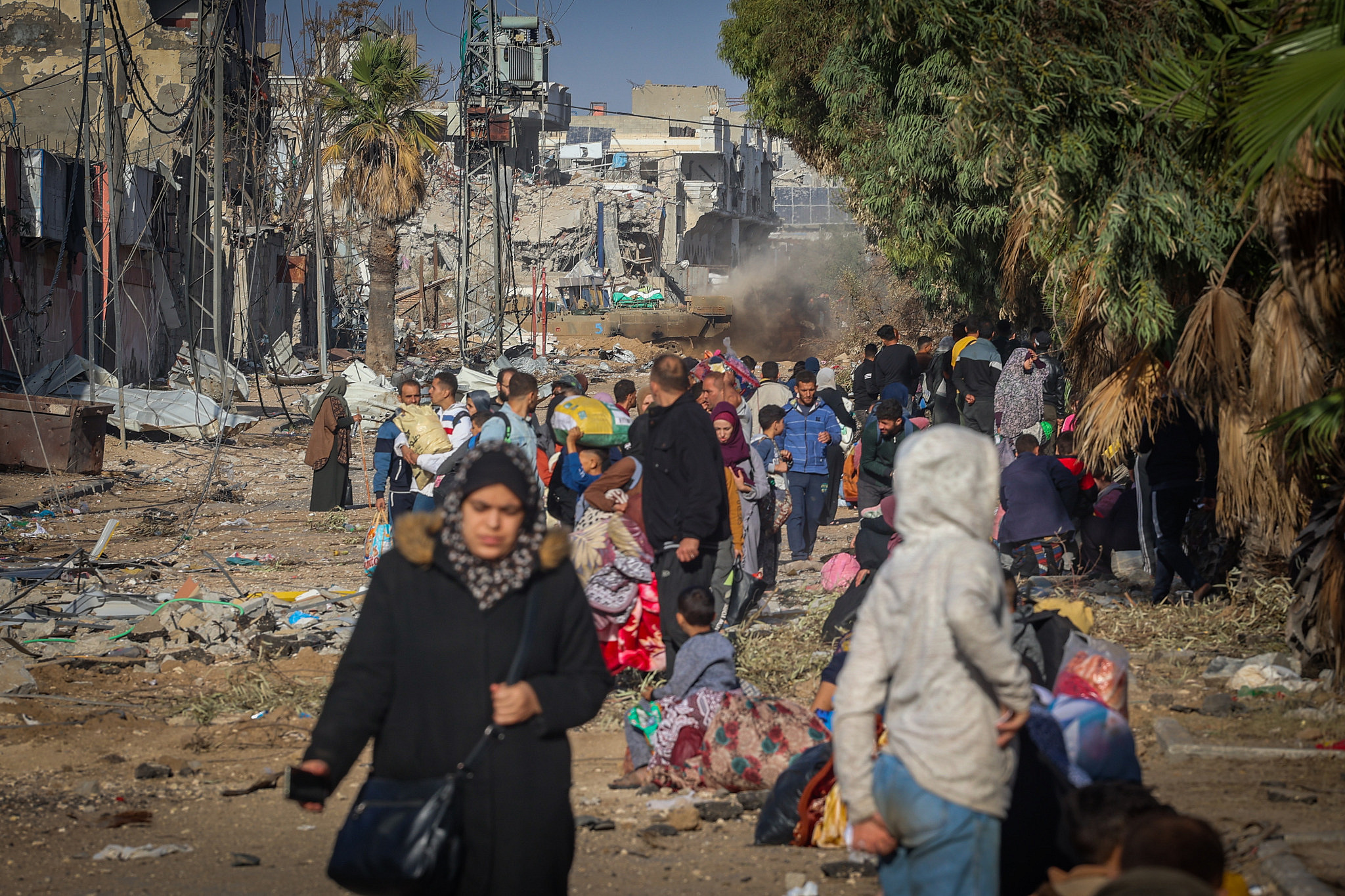
Palestinians walk on a road leading to southern Gaza after fleeing their homes in Gaza City, November 19, 2023. (Atia Mohammed/Flash90)
In 2006, Andrea, who had completed his first degree at Birzeit University in the occupied West Bank, redirected his initial plan to complete his graduate studies in Amman, Jordan, and returned to his beloved hometown, Gaza City. Despite Israel’s siege the following year and repeated wars since, he chose to remain in the Gaza Strip, resisting the urge of many of his peers to attempt to leave the small coastal enclave.
Shortly after the start of the current military offensive, the Israeli army ordered all residents of the Andrea neighborhood in Gaza City to relocate to the south. Andrea initially refused and took refuge in the Greek Orthodox church, but after the compound was hit in late October, he had to move again with his family and settle in the central city of Deir Al- Balah. “We had to evacuate several times until we reached Rafah, the furthest point south,” Andrea told +972.
“We have lost the joy. We only have prayer’
“For 80 days we have been witnessing all kinds of struggles, amid continued attacks on churches and places of worship, and loss of contact with the population, especially in the north,” Andrea continued. “We lost many friends during this journey and we lost connection with our people in the church.
“All this is unbearable when there is no political horizon,” he added. “We are now among hundreds of thousands of refugees seeking medicine and warmth. »
Andrea, a banker, was forced to abandon her 50-year-old family business located in Gaza City’s famous shopping mall, Al-Rimal. Years ago, he had wanted to start a company to help emerging businesses in the besieged Gaza Strip publicize their products and success stories. But soon after fighting intensified between Israeli forces and Palestinian armed groups in Deir Al-Balah, he was forced to evacuate again and settle in Rafah with his family.
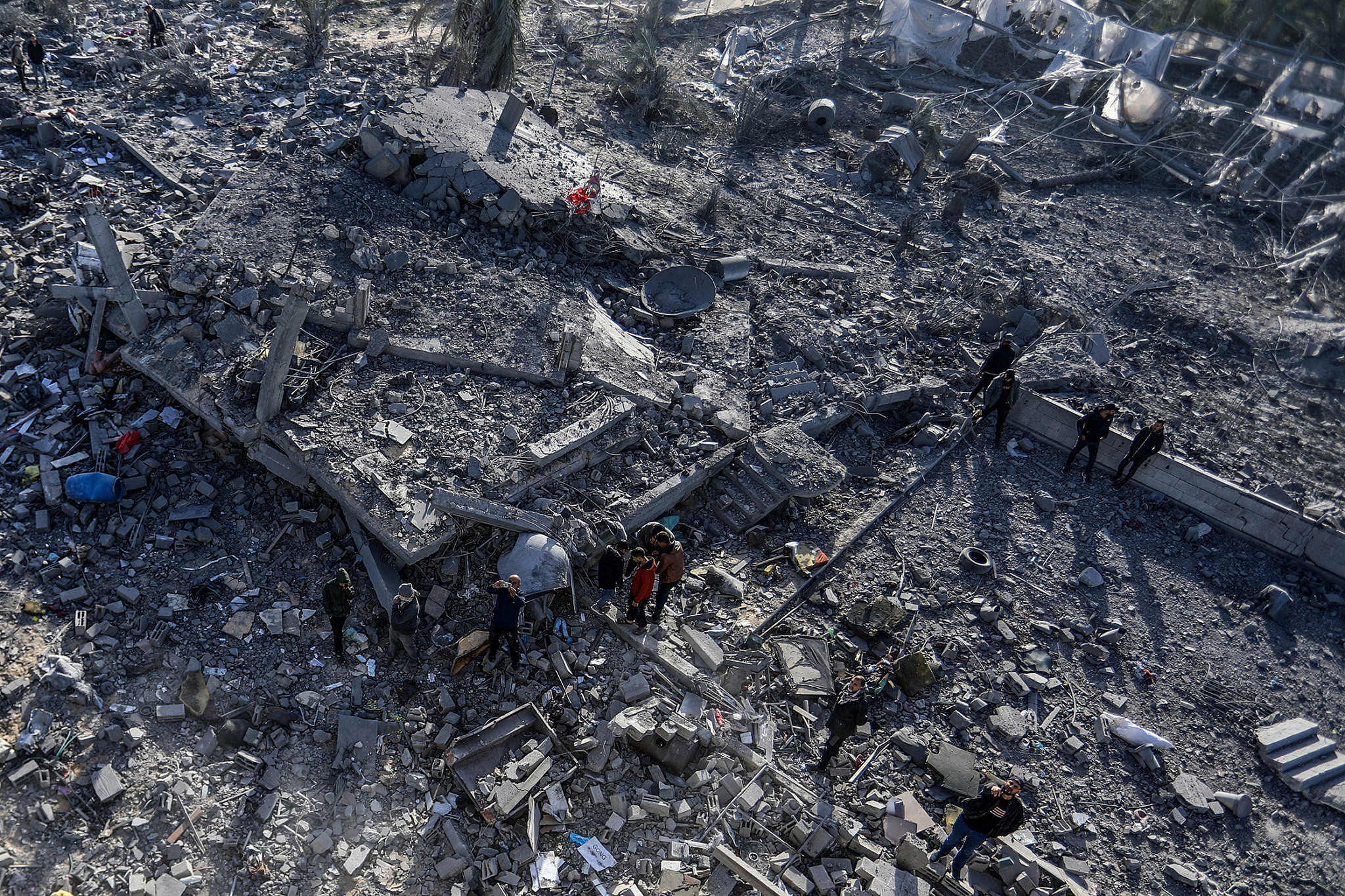
Palestinians at the site of an Israeli airstrike in Rafah, southern Gaza Strip, December 22, 2023. (Abed Rahim Khatib/Flash90)
“Today is a day like any other for us, not Christmas Day,” he lamented. “We want to mourn. We don’t want to celebrate – we don’t think we can. We have lost joy. We only have prayer.
Communication with the remaining families of the Latin Church in the North is very difficult, he explained. “When we hear a bell, the whole family gathers just to hear a hello from there. We are barely in contact,” he said in a sad voice.
“The general idea among all Palestinian Christians now is to immigrate, after the destruction of their homes and businesses, and since there is no political horizon signaling an end to this crisis,” he said. he added, expressing fear that the total destruction of Gaza would “drag everyone either under the rubble or into the desert.”
“My house, my neighborhood, my church, the roads leading to my house, even my gym, were razed, before the eyes of the whole world. There is nothing left for the 2 million Gazans. I can’t imagine what would be the case for the few remaining Christians,” he said.
Back in Ramallah, Reverend Diab also feared that Christian life in Gaza would be entirely wiped out. “Hitting churches, like hitting hospitals and schools, sends a message to all Palestinians that no place is safe,” he said. “Without people, churches will turn into museums. »


